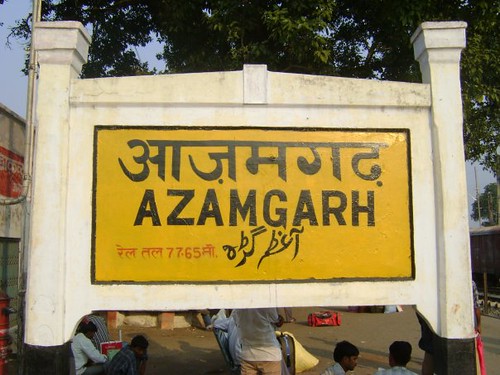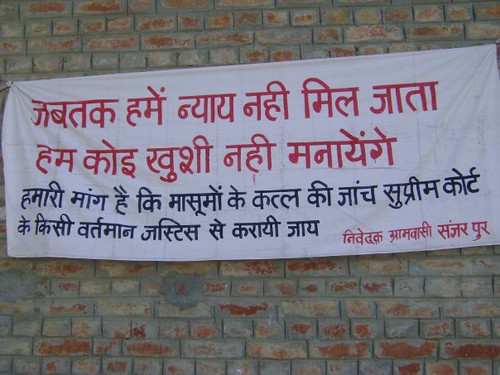By Mahtab Alam,
Mahfooz Ahmed, barely 21 years old, hails from Rasoolabad village of Azamgarh, a district of eastern Uttar Pradesh. A second year student of Bachelor of Arts at the town’s Shibli National College, Mahfooz also works at his college as a watchman of its guest house, in order to support his studies, since his family finds it difficult to make their ends meet. On 22nd of September this year, he was sent to Varanasi by his college authorities to get some Audit forms for the college, which was undergoing the process of some audits and the requisite forms were neither available in the college nor anywhere else in Azamgarh. By evening, Mahfooz had managed to collect the forms and was getting ready to catch a bus for the return trip. He informed the college authorities accordingly. But, he was nowhere to be seen the next day. Worried college authorities and family members tried contacting him but to no avail as his mobile turned out to be switched off.
Meanwhile, the next day, a few of the local TV channels flashed the news of Mahfooz being detained by the Anti-Terrorist Squad (ATS) from Varanasi, Uttar Pradesh. It was claimed in the media reports that he was detained by the ATS while taking pictures of the Hotel Taj in the Cantonment area of Varanasi, though, till the last minute, the officials denied this arrest. It was only after much public pressure that the Varanasi Police accepted that Mahfooz was under their custody. He was subsequently released after 44 hours of illegal detention. The police alleged that Mahfooz was stopped at the hotel’s gate, where he was caught while making a video of the hotel campus and found with the possession of some Pakistani currency. According to the agencies, Mahfooz told the police that it was given to him by a person who visited Azamgarh from Pakistan!

Mahfooz did accept that he took pictures of the Hotel with prior permission, but denied all the other charges. “I took photographs of the hotel with prior permission from the security guards at the gate. But when they got to know that I was from Azamgarh, I was communally abused and branded as a terrorist before being finally handed over to the police,” Mahfooz told Rajiv Yadav, a PUCL activist, after his release. “If the police have found Pakistani currency with Mahfooz, as they claim, why haven’t they produced it before a court?” asks Rajiv. “It is a clear case of unlawful detention and we demand a proper clarification from the police and intelligence agencies,” he adds. This is not, afterall, the first time that a resident of Azamgarh, particularly a Muslim, has been branded as a terrorist or abused and subsequently detained.
In March 2009, Mohammed Ashad, an Engineering student from Azamagah, who was then studying in Noida, was taken into custody on the grounds that he hailed from Azamgarh and that he was a Muslim. He was arrested from sector 18 of Noida, while he was driving a bike along with his friend Amar Deep Singh, and detained and interrogated for 24 hours. In November 2008, the members of a hockey team from Azamgarh were branded as terrorists. The team was on its way to Etawah from Kanpur on November 10th when some boys who had forgotten their jersey in the train’s coach they were travelling in, went back to collect it. Inside, the government railway police (GRP) personnel stopped them and asked their whereabouts. On being told they were from Azamgarh, the police officials detained the players and declared them terrorists.
There are many cases like this. Rajiv believes that the police and other agencies are doing so, to malign the Muslim community and create a sense of fear amongst the Muslim youth. “It’s nothing but communal witch-hunt and desperate attempts to give a bad name to Azamgarh,” he asserts. All of this started in the wake of the ‘encounter’ at Batla House in September 2008, in which two of the boys who were killed were from Azamgarh. Thereafter, the police and the intelligence bureau officials started claiming that ‘Azamgarh was slowly but surely, becoming a hotbed for terrorist activities’, which was unquestionably reported by the mainstream media houses. The residents’ demand for a judicial probe in the ‘encounter’ at Batla House case by a sitting judge of supreme court is still pending and every year, they organise conventions and rallies to re-iterate their demand. Residents increasingly face problems in getting their Passports made or renewed. In my recent trip last week, I was told in a conversation with a local activist, Tarique Shafeeq that, “since three years, hundreds of residents have been denied access to new passports or its renewal,”. He further complained that, “Wherever we go, we are seen suspiciously. We have to be extra cautious”. After every blast in the country, both the police and the media try to make some connection with Azamgarh, which has made the life of its residents more difficult.

As a result, there’s a complete pall of insecurity and gloom that’s been pervading its residents. The youth are scared and their parents afraid to send their children out of their homes, be it for studies or jobs. Moreover, residents of Azamgarh have been forced to vacate their rooms by landlords in Delhi and other places. Many youths have been missing. There is absolutely no knowledge of their whereabouts. Tarique Shafique’s brother, who studied para-medical sciences at Hamdard University, found it very difficult to find a place to stay in Delhi. “Is it a crime to be a Muslim and a resident of Azamgarh?,” asks Tarique. The Country, especially the State and its various agencies, need to answer this before it is too late.
(MahtabAlam is Delhi based Civil Rights Activist and Journalist. He can be reached at [email protected])
[Photos by Mahtab Alam]

